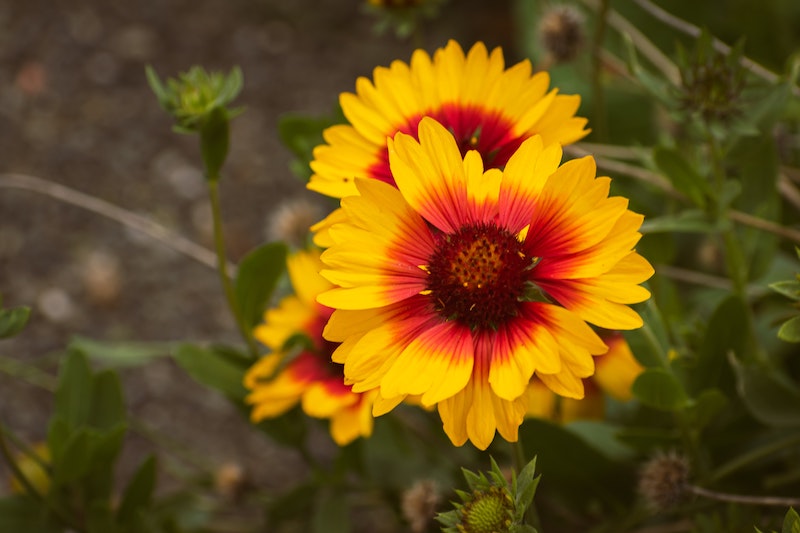Blanket flowers, Gaillardia x grandiflora, are considered to be non-toxic to both humans and animals. The leaves can be a source of irritation if rubbed into the skin of people who are sensitive to the sesquiterpene lactones found in many plants of the Asteraceae family.

Are Blanket Flowers Poisonous to Children?
Brushing against the hairy stems and leaves of Blanket Flower can cause skin irritation for children. A red, itchy patch will develop on the part of the body to have direct contact with the plant. Washing the area with soap and water will remove any residue of the chemicals. Ingesting small amounts of plant material often will result in mild stomach upset or vomiting. Children that ingest large amounts of Blanket Flower will have a more severe reaction and should be seen as soon as possible by a family doctor or urgent care.
Are Blanket Flowers Poisonous to Dogs?
Dogs rarely have a severe reaction to eating small amounts of Blanket Flower stems or flowers. Mouth irritation and contact dermatitis occurs most frequently from contact with the hairy leaves and stems. Smaller dogs and puppies may react to ingesting small amounts of leaves or stems.
Are Blanket Flowers Poisonous to Cats?
Cats who brush against Blanket Flower or ingest small amounts of the foliage or flowers may have mild reactions to the sesquiterpene lactones; contact dermatitis of the mouth or face often results. Smaller cats and kittens will be affected more than older cats due to their lower weight. Excessive itching anywhere on the body could be due to exposure, and the affected area should be washed and dried as soon as possible to relieve symptoms.
Are Blanket Flowers Poisonous to Other Animals?
Rarely do livestock or other animals graze Gaillardia x grandiflora. They are ornamental cultivars used in the home garden. Gaillardia pinnatifida is more likely to be in an area of grazing and is considered non-toxic to livestock. Blanket Flowers are deer and rabbit resistant.
Symptoms Of Blanket Flower Poisoning
Always check with your doctor or veterinarian for guidance if you suspect Blanket Flower poisoning.
Here are some common symptoms to look out for:
- Itching of one area of the body
- Redness or rash on the body or in the mouth
- Stomach upset
- Lessened or no appetite
Preventing Blanket Flower Poisoning
Blanket Flower is not considered a toxic plant for either humans or animals, although skin irritation can be caused by brushing against the leaves and stems. Wearing long pants or long-sleeved shirts when working around Blanket Flower will help protect the skin from exposure. Immediately washing any areas that come into contact with the leaves or stems will lessen the reaction.
Pet Poison Helpline
If something were to happen to your furry friend, and you suspect that they are suffering from Blanket Flower poisoning, there is a poison control hotline to call for 24/7 vet advice. It is called the Pet Poison Hotline, and their phone number is (855) 764-7661.
Sources:
"Potentially Harmful Perennials OH 63." University of Vermont Extension System. www.uvm.edu/
"Skin irritation caused by blanket flower (Gaillardia sp.)." Lady Bird Johnson Wildflower Center. wildflower.org
 |
Author Robbin Small - Published 3-11-2023 |
